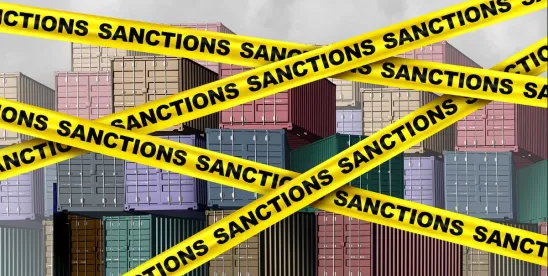On 12 September 2024, the UK government released the new Trade, Aircraft and Shipping Sanctions (Civil Enforcement) Regulations 2024 (the Regulations), which will come into force on 10 October 2024. The Regulations grant the Office of Trade Sanctions Implementation (OTSI) new civil enforcement powers against breaches of trade sanctions. They aim to ensure compliance with wider UN obligations and to further the UK’s foreign policy objectives in promoting respect for democracy, good governance and the rule of law.
OTSI will have the power to investigate alleged breaches of trade sanctions and to take enforcement action in relation to:
- The provision and procurement of sanctioned services;
- The movement, making available, or acquisition of sanctioned goods and technology outside the United Kingdom; and
- The provision of ancillary services for the transfer, making available, or acquisition of sanctioned goods and technology outside the United Kingdom.
OTSI’s main powers in relation to the above are:
- Civil monetary penalties;
- Powers to request information; and
- Imposing reporting obligations on “relevant people.”
HM Revenue and Customs will remain responsible for the enforcement of trade sanctions that fall within its remit, whereas the Department for Transport will handle noncompliance with aircraft and shipping sanctions.
OTSI’s Main Powers
Civil Monetary Penalties
OTSI will have the power to impose civil monetary penalties up to £1 million or 50% of the estimated value of the breach, whichever is the greater. Breaches will be determined on a strict liability basis, meaning that when determining whether there has been a breach of sanctions, it will not be a defence that the person in breach did not know, reasonably suspect or believe that an offence had been committed. Penalties will be imposed based on the balance of probabilities.
OTSI may publish reports of cases where civil monetary penalties have been imposed. Such reports can include information on who the penalty has been imposed upon, an overview of the facts of the case, why the penalty has been imposed, the aggregate value of the breaching transactions, and the penalty value imposed on each person.
Power to Request Information
OTSI will have the authority to request disclosure of information to monitor compliance, detect evasion and investigate a suspected breach or failure to comply with an obligation.
As part of this, OTSI may require the production of specified documents. If the individual or organisation does not have the requested documents, they must take reasonable steps to obtain the documents and to keep those documents in their control.
It is an offence not to comply with a request for information.
Reporting Obligations
New reporting obligations will apply to those deemed “relevant persons.” Relevant persons will be required to report any known or suspected breaches as soon as practicable that have become apparent during the course of their business. Relevant persons include financial services companies, lawyers, notarial service providers, and money transmitting companies.
It is an offence for a relevant person not to comply with the reporting obligations and they may be subject to a fine, imprisonment or both.
It should be noted that timely voluntary disclosure of a suspected breach could lead to a discretionary reduction of a civil monetary penalty of up to 50%. This acts as an important incentive for relevant persons to comply with their reporting obligations.
Mitigating Factors
There are several mitigating factors that OTSI will consider when assessing a breach:
- Timely voluntary disclosure of the suspected breach by the business or person responsible;
- Timely mandatory disclosure of the suspected breach by a provider of financial or legal services;
- Cooperating with requests for information;
- Compliance with recordkeeping obligations;
- No previous cases of having breached sanctions legislation; and
- Knowledge of sanctions and compliance systems that are proportionate to the size, resources of the business, and exposure to sanctions.
What This Means for Businesses
The Regulations markedly extend the UK government’s ability to respond to violations of trade, aircraft and shipping sanctions by enhancing its monitoring, detection and investigatory capabilities. This is significant as it illustrates the UK government’s commitment to sanction compliance and its intention to intensify enforcement efforts.
OTSI’s ability to impose civil penalties makes it essential for companies to ensure compliance with UK trade sanctions. To minimise the risk of violation, companies that fall within OTSI’s newly expanded remit should consider conducting renewed risk assessments, implementing procedures to respond to potential requests for information and preparing policies that assist with relevant reporting obligations. If companies or individuals suspect a breach of trade sanctions, they should consider reporting it to OTSI as soon as possible to minimise the risk of civil penalties.





 />i
/>i

